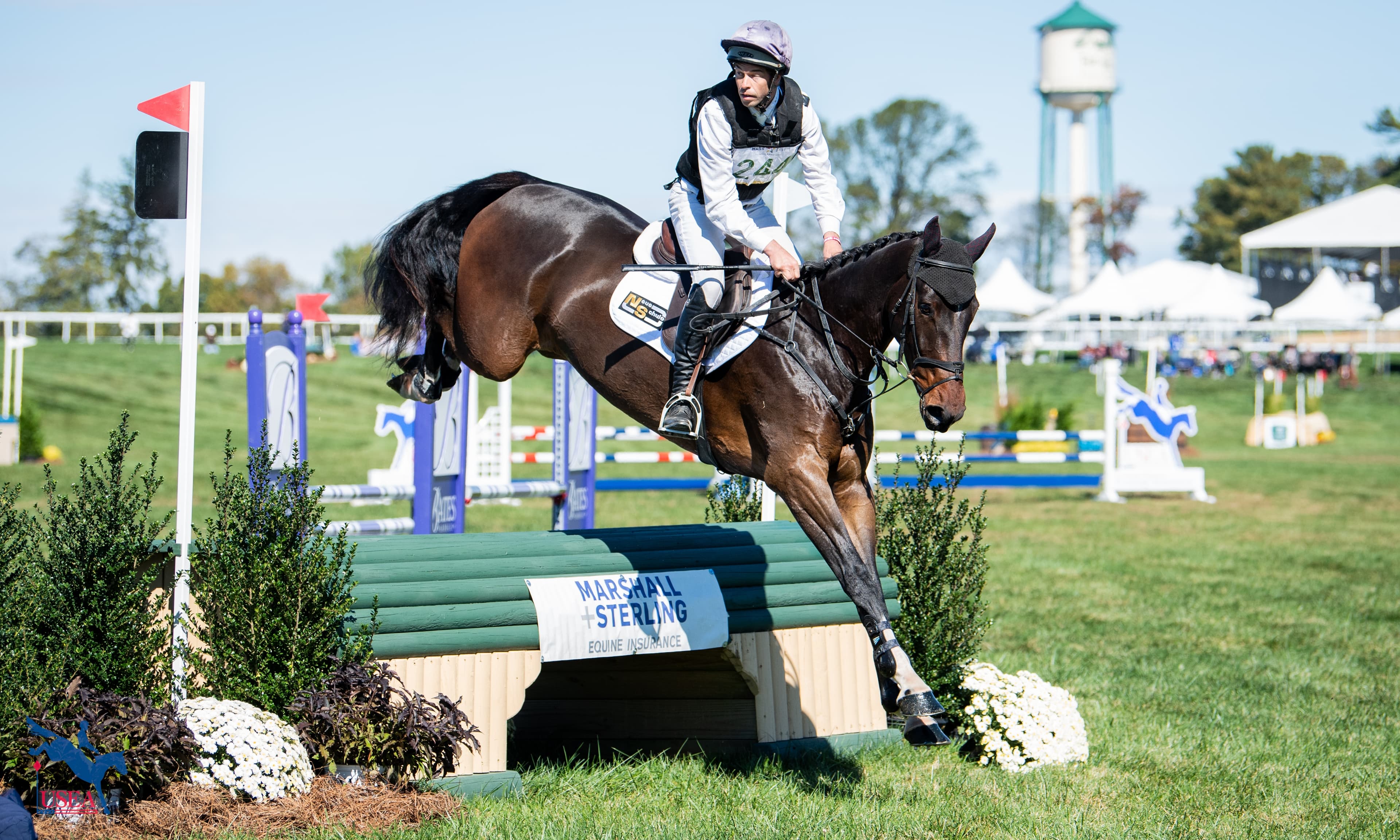Alex Martini: The Heart of an Eventer
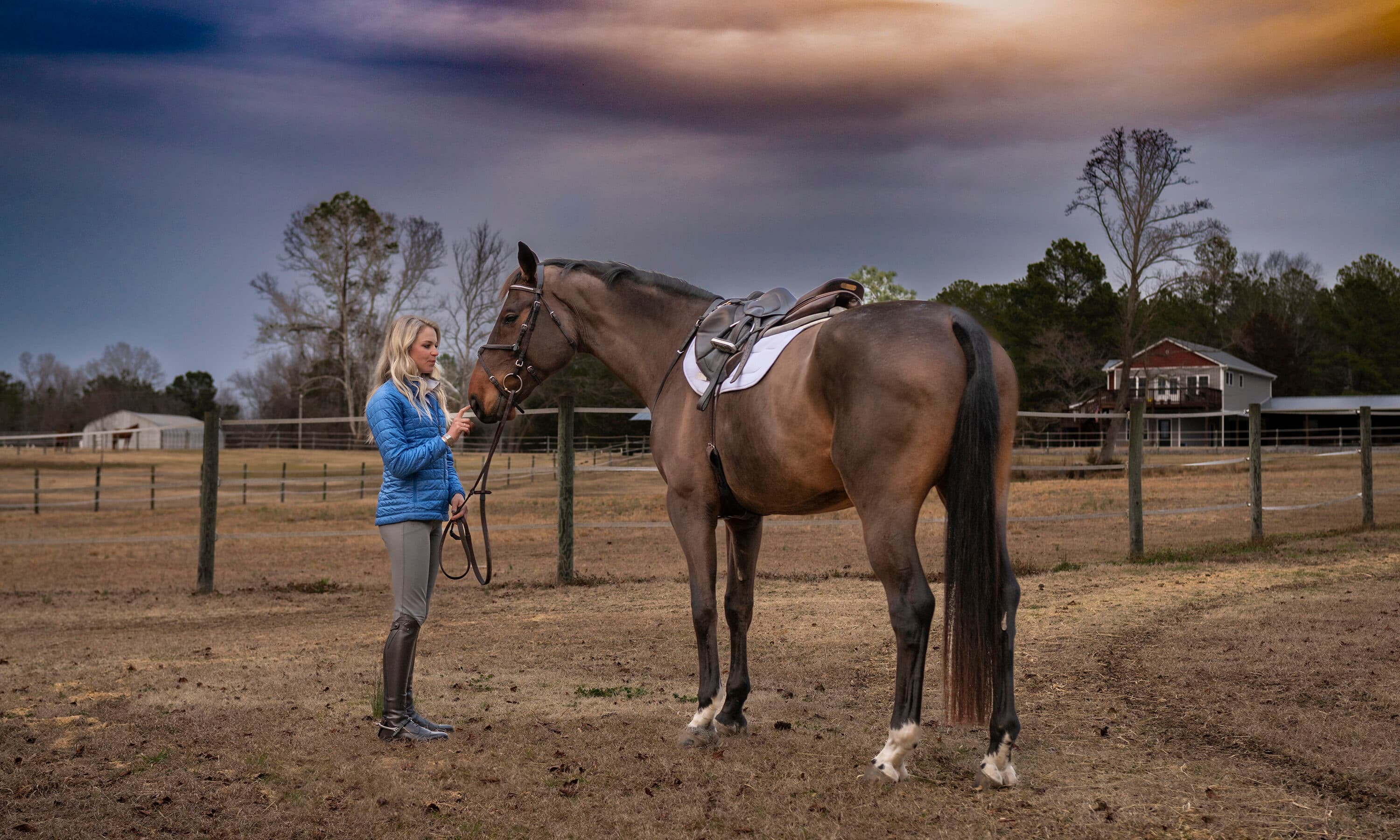
This story first appeared in the April 2022 issue of Sidelines Magazine.
Alex Martini’s mother had more reason than most not to want Alex to jump a horse or do cross-country. Alex was born with hypoplastic right heart with two atrial septal defects and pulmonary atresia: life-threatening heart defects.
“It was very, very terrifying, because I didn’t understand the anatomy of the heart—she was born and 12 hours later they told me they didn’t know if she’d live,” Mary Griffith, Alex’s mother, said. “We didn’t even get to choose the surgeon; they just had to move on it with her condition.”
Alex’s complicated diagnosis meant her heart was one-third the normal size and had two holes. Her pulmonary valve, responsible for ensuring oxygenated blood to the body, wasn’t working, either. By the time she was 2 ½, Alex had had three open-heart surgeries. Doctors repaired the holes and attempted twice to fix the pulmonary valve, to no avail. On the third surgery, they simply removed the valve and informed the family that Alex’s body would compensate—until it couldn’t, and she would inevitably go into heart failure.
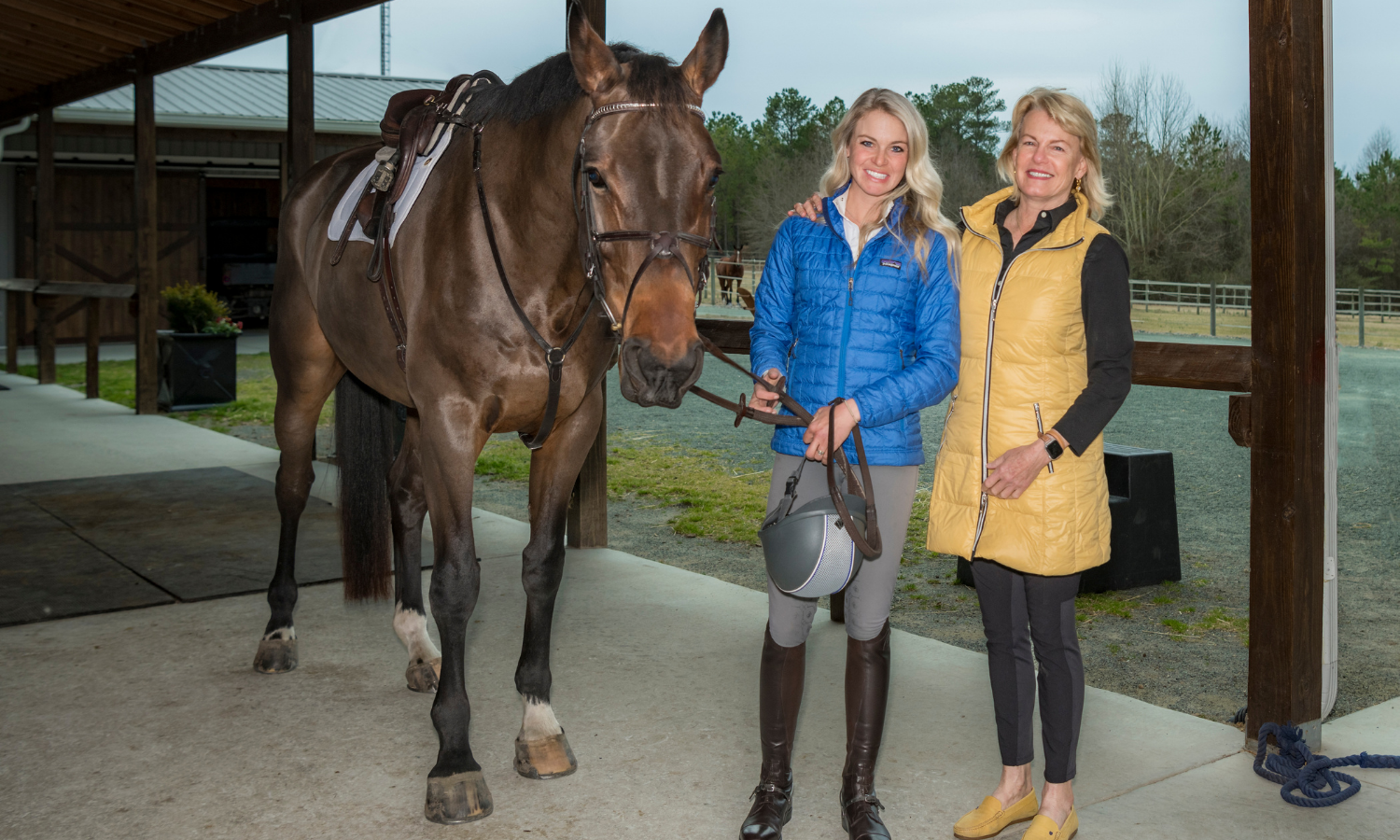
“As a parent, you get tired of worrying and tired of being scared,” Mary said. “She was a child who just wanted to grow and be happy, and I thought, Her life might not last as long as I want it to, but I want it to be the best, live-in-the-moment kind of life. I just wanted her to be happy.”
Mary’s decision to let her daughter risk her life by pursuing eventing turns out to have saved it. Every time Alex’s heart has physically begun to fail, her heart’s passion for eventing has kept her going.
“The quality of her life is so much more important than the quantity of her years, and this is her passion,” Mary said. “This has kept her coming back and kept her sticking with rehabbing, because it’s just so painful after five open-heart surgeries. You have to live in the moment. I learned, as her mom, that you can’t ever take tomorrow for granted, or plan her second birthday party, because you just don’t know. The doctors didn’t know. That was 31 years ago.”
Finding Her Passion

On her mother’s side, Alex’s family was always into horses—her great-grandparents, grandparents, mother, aunt and cousins all rode English. Alex grew up with it first in California as a child, receiving her first pony at 6 and riding in a Western saddle since she was so small. When her family moved to Illinois, Alex wanted to keep riding. “No one there rode Western, and so I converted to English to fit in with the Pony Club and all the kids there, and took up eventing,” Alex said. “It was a lot of fun, particularly the cross-country. The jumping I could get on board with—though the dressage took me a very long time to warm up to!”
The introduction to eventing became a lifestyle after the family’s move to a farm in the Southern Pines, North Carolina, area when Alex was 12. She moved through the levels with the help of Marc Donovan, one of her role models who took her under his wing. As a Young Rider, she represented Area II several times aboard Copperfield—known around the barn as Moose. “He was my first upper-level horse and became the benchmark for all horses after him,” Alex said. “Everyone has that one really special horse, and he is definitely the one for me.”
It was her partnership with Moose that sparked Alex’s decision to pursue eventing professionally. “I’d always wanted to ride full time as a kid, but when I started getting out and competing more at the upper levels, when I had the opportunity to do some FEI stuff, I was just hooked,” she said. “I wanted to keep going, and that’s all I wanted to do.”
Alex learned about all aspects of the business as a working student for Doug Payne, and after college, she returned to Southern Pines to begin building her business. But before her business had even gotten off the ground, her heart, and her dedication to eventing, was tested—and it had nothing to do with her missing pulmonary valve.
At 23, Alex’s dear friend Zoe DiGiovanni was killed in a riding accident moments after Alex and her horse had returned to the barn from a ride with Zoe and another friend. “That was a big blow,” Alex said. “Unfortunately I think there’s a number of people in the eventing community that can really relate. You do kind of question—am I doing the right thing? Should I keep going after this?”
But Alex knew Zoe had been doing what she loved—so she continued to do so, too.
Heart Failure
Things seemed to be going well as Alex developed her business. She had several horses in training and a group of clients, and was competing at the three-star level. Then, she went into heart failure. “I was able to go to the gym, ride, work out, swim, bike, whatever—then one day it was like, I can’t walk up the stairs. I can’t breathe,” Alex shared.
Alex went to the emergency room—in true gritty eventer form, she drove herself. “I didn’t feel like it was an ambulance situation, but I did feel really, really bad!” she said. “I went in, they took me back and said, ‘Well, you’re actually in heart failure. That’s probably why you feel really bad.’”
Her heart had hit its limit in compensating for the missing pulmonary valve, sending her blood oxygen levels into a dive. Alex was referred to Duke University Hospital and its renowned cardiac team where they made a plan for her fourth open-heart surgery, to put in a new valve. “I had horses in training, and I sent them back to their owners,” Alex said. “I had an upper-level horse at that point in time, and I decided to sell him after that major surgery—I thought I would just get right back out there, but I quickly realized that was not realistic.”
The valve placement itself went well—but just six months later, Alex’s sternum was broken for the fifth time in surgery to replace broken sternal wires and clean out a serious bone infection that necessitated the removal of part of her sternum. “The recovery is really long from those kinds of surgeries, especially when you’ve had multiple—it’s just hard,” Alex understated.
“When they open the rib cage, it’s so painful on your back as well as your sternum and chest—it’s a whole body experience,” Mary said. “For us, it was really difficult to find people her age—or any age!—who had had five open-heart surgeries, and we never actually met one.”
Just a few months before Alex “hit a wall,” she met and started dating Matt Martini. “I’m kind of surprised that he stayed with me; we hadn’t been dating very long, and I told him, ‘This is about to get really ugly, and you do not have to stay with me.’ It wasn’t serious. But he stayed with me. I was not pleasant then, either—it wasn’t like I was fun to be around,” Alex laughed.
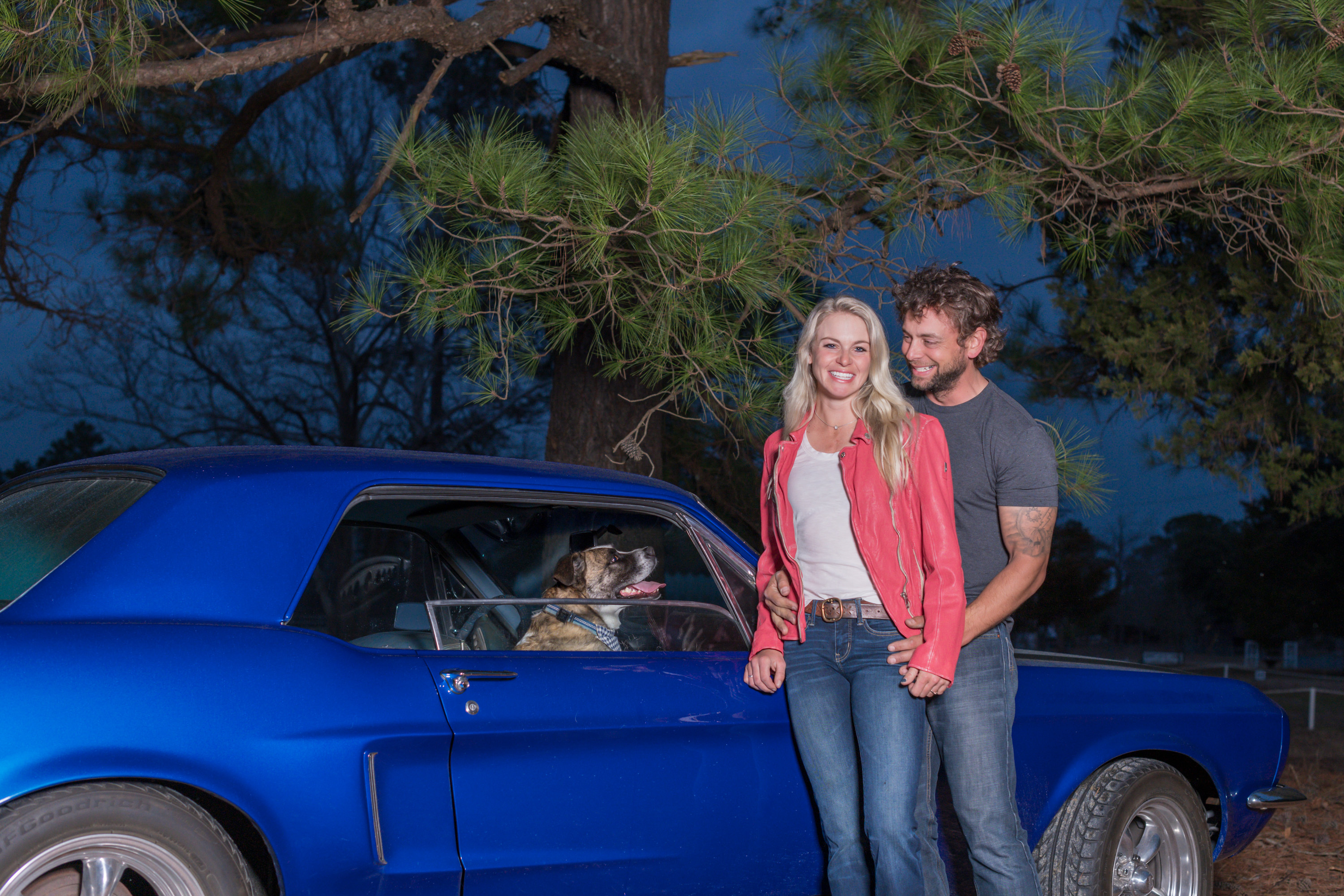
“Matt pretty majorly stepped up,” she said. “He wasn’t into horses when we met, but when I had surgery, he learned how to feed, he learned how to do stalls, he learned how to blanket—all of it. All of it, so that I could just go out to the barn and hang out. He sort of did all the interacting with the horses, especially right after surgery, when it was pretty fragile still. The concern was you don’t want a horse to smack you in the chest or something; you can’t take a direct hit to the chest. You can’t drive for quite a while, for the same concern, so Matt chauffeured me around and came out to the barn to take care of the horses for me while I just sat there and instructed him.”
“Passion is everything in life,” Mary said. “For those who are lucky enough to find it, it will keep you going and move you through all kinds of obstacles—the bad times. We would walk up to the barn, Alex couldn’t hold a horse or lift a feed bucket, couldn’t groom them—it was torture for her, in her healing and her recovery,” Mary said. “But she stuck with it because she could give them a carrot, or kiss them on the nose. That, I’m certain, is what gave her the tenacity to keep going. I’m so proud of her toughness, her grit and her determination regardless of the struggle, the incredible struggle, to get back in shape.”
Rebuilding Her Body
After the initial recovery period, including a PICC line with antibiotics, Alex began the arduous process of rebuilding her body. She’d completely lost all muscle mass and had to go through a long period of physical therapy just to be able to function—let alone ride or finish a day without feeling exhausted once she did start riding. But the hope of someday getting back to competing kept her going.
“Recovery can definitely feel very defeating at times, but the only way to move past it is to look ahead and make some new goals and then just try to keep going,” she said. “All this time that I spent putting into recovering and not just recovering like ‘okay the heart is fixed,’ but feeling like I'm back at 100% physically—going to the gym and riding and riding with stirrups, all of it—the whole motivation was to get back and feel like, ‘Okay, I can go do this.’”
Alex had a group of devoted clients that continued to take lessons even when she couldn’t ride, and credits her family with helping her see that there was a light at the end of the tunnel by taking her to shows to cheer on friends. She also had Moose. “I really, really, trust him,” she said. “I was able to go to the barn and handle him, groom him, spend time with him and not worry he was going to do something stupid and set me back in my recovery. I think he also knew there was something going on—he’s not usually a big cuddle bug, but he was particularly affectionate during that time.”
In the beginning, Alex feared doctors would try to limit her pursuit of eventing to avoid “unnecessary risks,” but everything appeared so normal on stress tests once she returned to health that they have no reason to restrict her activity—despite her unusual case. “This is very uncommon—the doctors don’t have patients like me, younger cardiac patients that have had multiple surgeries and then want to go compete in any sport at a higher level,” Alex said. “But they cleared me to go back doing whatever I would like, which is amazing—I’ve gotten pretty close with my cardiologist, and I think he knows me well. He knows that this is what I love to do, and what I live for. It’s not really worth doing all those surgeries and going through all of that recovery if I’m not going to pursue what I really want to do in life.”
Rebuilding a Business
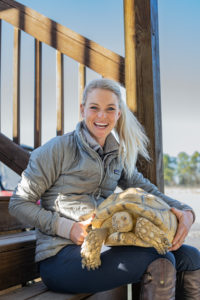
Matt and Alex were engaged a year after they started dating, and married a year after that, in 2017. They bought a small farm just 20 minutes from Mary, and Alex began rebuilding her business. She has a small, focused group of clients and horses, and has been bringing along young horses through the lower levels. The small size is perfect for her business, since the farm is their home—complete with “tortoise turnout” for Junior, the 20-year-young tortoise Alex got in college who comes when he’s called. There’s also plenty of space for Alex’s dog, Bubba; a miniature donkey; a couple of barn cats; and Moose, who is 26 and living a very happy retirement.
Last year, Alex’s pulmonary valve failed yet again—but technology had advanced so far that a new valve was placed via catheter rather than open-heart surgery, with a drastically reduced recovery time. On a day-to-day basis, Alex’s missing pieces of sternum, or “non-union,” causes her quite a bit of pain—but she is otherwise healthy, and ready to move on. “After my valve surgery last year, I just felt like, Alright, I need to go do this. I feel good. I’m in a good spot cardiac-wise. I don’t want to waste any more time, I want to get back out there,” she said.
Alex purchased Poynstown Jaguar, aka Jag, less than a year ago with the goal of returning to the upper levels and developing him to the top of the sport. “It’s incredibly humbling because it’s hard to be younger and watch your friends or your peers go out and do things that you couldn’t do anymore,” she said. “It was definitely good for my ego, and I’m hoping I can use everything I learned going forward. Even if you’re not exactly where you want to be, you have to learn to feel satisfied or happy with the process.”
On one hand, there’s a lot Alex learned—and a lot others can learn—from her experience with heart problems. On the other, she doesn’t want that to define her. “I want to do things other than just be a professional heart patient,” she quipped. “Yes, that happened—it is what it is. It’s unfortunate. But I do think it puts things in perspective and it definitely made me much stronger, mentally. It makes everything else not as big of a deal. I feel like I got a second chance, and I don't get as worked up over things like I used to when I was a little bit younger. Now, I want to use all of that, take as much positive as I can get out of it and move on—and enjoy the process.”
For more information, follow Alex at www.facebook.com/alexmartinieventing or on Instagram @alexm_eventing

